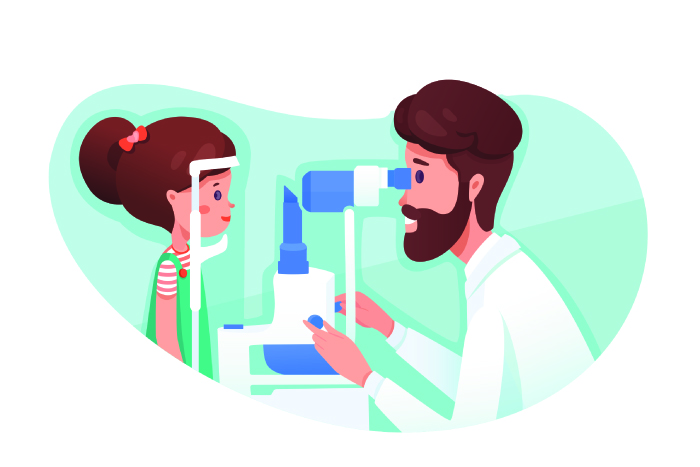Ophthalmology
Ophthalmology is a branch of medicine that deals with the diagnosis, treatment and prevention of conditions of the eye.

What is ophthalmology?
An ophthalmologist is trained to manage conditions of the eye and its surrounding structures that can hamper your vision. When treated early, eye conditions can be easily managed with minimum discomfort.
With a growing elderly population, a large number of people visit their ophthalmologists with age-related eye conditions like cataracts, macular degeneration, etc. Many systemic conditions such as diabetes can cause such conditions as diabetic retinopathy, that require a multifactorial management approach.
To know more, search for an ophthalmology doctor near you or an ophthalmology hospital near you.
What are the specialties in ophthalmology?
An ophthalmologist treats the eyes but he or she undergoes further training to specialize in one of the following subspecialties of ophthalmology:
- Anterior segment surgery
- Corneal and external disease specialization
- Cataracts and refractive surgery
- Neuro-ophthalmology
- Glaucoma
- Ocular oncology
- Oculoplastics and orbital surgery
- Ophthalmic pathology
- Pediatric ophthalmology
- Uveitis and immunology
- Vitreo-retinal surgery
What are the types of eye conditions you should be aware of?
Eye conditions and disorders can arise from any of its parts, both internally as well as externally. Some common eye conditions that are treated by an ophthalmologist are:
- Macular degeneration (an age-related condition)
- Glaucoma
- Diabetic retinopathy
- Cataract
- Refractive errors
- Corneal conditions
- Eye conditions arising from neurological issues like optic nerve problems, double vision, abnormal eye movements, etc
- Amblyopia
- Strabismus or squint
What are the common symptoms of eye disorders?
Different eye conditions show different symptoms. Commonly occurring symptoms of eye disorders include:
- Sudden pain in the eye
- Recurrent or chronic eye pain
- Hazy or blurred vision
- Double vision
- Swelling in and around the eye
- Redness in the eye
- Loss of peripheral vision
- Seeing flashes of light or sudden bright spots floating
- Pain and sensitivity to bright light
- White areas observed in the pupil of the eye
- Itching or burning sensation in the eyes
- Bulging eyes
- Night blindness
What causes eye disorders?
While some eye conditions are due to genetics and heredity, others arise due to poor lifestyle habits, improper nutrition, infections and trauma. Some common causes include:
- Excessive use of devices leading to eye strain
- Vitamin A deficiency
- Muscle problems within the eye
- Systemic conditions like diabetes, AIDS, rheumatoid arthritis and ulcerative colitis
- Aging
- Issues with the tear glands
- Exposure to chemicals and irritants
- Improper use of contact lenses
When should you consult an ophthalmologist?
If you experience any change in your vision, you must contact your ophthalmologist immediately. You may need emergency care if
- You experience a sudden loss of vision
- Severe and sudden pain in one or both eyes
- Injury to the eye
You can request an appointment at Apollo Spectra Hospitals, Chembur, Mumbai.
Call 1860 500 2244 to book an appointment.
How are eye disorders treated?
Treatments for eye disorders depend largely upon their causes. When you visit an ophthalmologist for a vision-related problem, he or she will ask for a few tests and diagnose the condition and its cause. The treatment options available for eye disorders may include:
- Prescription glasses and lenses
- Oral medications and eye drops for infections
- Surgical procedures
- Eye physiotherapy and maintenance.
Conclusion
Visiting an ophthalmologist at least once every year helps you monitor your eye health and diagnose any eye disorders early. Early detection and treatment of eye conditions can prevent complications. Our eyes are delicate organs and require appropriate care.
Diabetic retinopathy does not have signs or symptoms in its early stages. However, signs in the slightly advanced stages of the condition include:
- Blurring of vision
- Dark areas or spots in the vision
- Impairment in color vision
- Loss of vision
If you have prescription glasses that you wish to do away with, you can opt for LASIK surgery. In this surgery, the ophthalmologist corrects the lens or cornea problem that causes poor vision.
A cataract is characterized by the clouding of the eye lenses due to aging, thereby causing poor vision. Ophthalmologists perform cataract surgery to remove the clouded lens and replace them to restore your vision. It is a painless surgery that is performed in less than 30 minutes.
Our Doctors
DR. NEETA SHARMA
MBBS, DO (Ophthal), ...
| Experience | : | 31 Years Experience |
|---|---|---|
| Speciality | : | Ophthalmology... | Location | : | Chembur |
| Timings | : | Thur, Fri : 10:00 AM... |
DR. PALLAVI BIPTE
MBBS, MS (Ophthalmol...
| Experience | : | 21 Years Experience |
|---|---|---|
| Speciality | : | Ophthalmology... | Location | : | Chembur |
| Timings | : | Mon - Wed, Fri & Sat... |
Treatments
Our Top Specialities
NOTICE BOARD
CONTACT US
CONTACT US
 Book Appointment
Book Appointment




.svg)
.svg)
.svg)
.svg)








